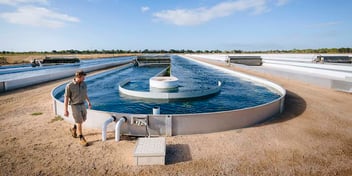Improving water quality to grow a Great Barrier Reef
Farmers in Queensland have embraced change to mitigate the impact of agriculture on the Great Barrier Reef, as part of a three-year project.
The Growing a Great Barrier Reef (GGBR) project was established in May 2016 by the federal government, Queensland Farmers Federation (QFF) and natural resource management organisations. The aim of the $45.6 million initiative was to minimise soil loss, and optimise fertiliser and pesticide application to safeguard the future of the Reef.
Judging by its final annual report, released this month, GGBR deems itself worthy of a four out of five grading for its across-the-board achievements in encouraging improved farming methods while lessening the impact of dissolved organic nitrogen (DON), in particular, on water quality.
QFF CEO Georgina Davis said the GGBR’s new water quality model took central and north Queensland farming practices beyond best practice and fast-tracked innovation.
Improved data management
Central to the progress, according to the report, was the creation of a common database, which was “a major contribution to improved efficiency in reporting and quality control”.
The Great Barrier Reef Foundation has shown interest in using and maintaining the database and the QFF said “the potential is there for the database to provide a platform for all projects addressing on-ground change in Reef areas”.
“The multi-organisational use of the GGBR database and its ability to directly input into P2R (paddock to reef) will be an ongoing part of the legacy [of GGBR],” the report states.
“Even if the GGBR project as such does not continue in the same way (funding and relevant joint project being needed to maintain current approach), some individual partners are already using the platform in other areas.”
According to the report, there were initial teething issues, including convincing everyone involved to use the same database.
There were also early complaints of double handling, as well as complexity and time demands, but the platform eventually “facilitated ease of data collation and reporting across commodities and regions”.
“It also helped evolve the conversations needed to work towards a better understanding of terminologies and an interpretation of what constituted practice changes under the P2R guidelines,” the report states.
One view of innovation
Davis said the single database allowed uniform implementation of changes in farming practice.
“The extension information across five Reef catchments allowed the alliance to chart a ‘reef-wide story’,” she said.
The huge spread of actions, education and training undertaken during the three-and-a-half year project had “made huge improvements to the quality of the water leaving the farm”.
“Innovative nitrogen reduction practices, dedicated approaches to extension, revegetation of farms and conservation of wetlands and riparian areas are just some of the success stories from the agricultural sector working to protect the Great Barrier Reef through this project,” she said.
“In the future, balancing this approach with more holistic programs will ensure the ongoing legacy from the significant investments made in the GGBR’s project model.”
During the project, more than 40 extension officers engaged with 1588 landholders to deliver one-on-one customised farm planning and personalised technical advice.
A total of 1,783,998 hectares of farmland across Queensland’s Reef catchments demonstrated practice change such as dissolved inorganic nitrogen savings of 366 tonnes.
As part of the project, farmers, extension officers and community members who excelled at adapting to the new practices were presented with Reef Champion Awards.
With the GGBR project now concluded, focus has been placed on ‘hotspots’ and specific industries that are deemed at risk of losing the momentum towards the long-term practice change encouraged by GBBR.
The Barrier Reef Foundation has provided about $3 million towards this work.
The theme of this year's Australian Water Association North Queensland Regional Conference is Reefs, Catchments and Climate Resilience. To submit an abstract and to find out more, click here.

